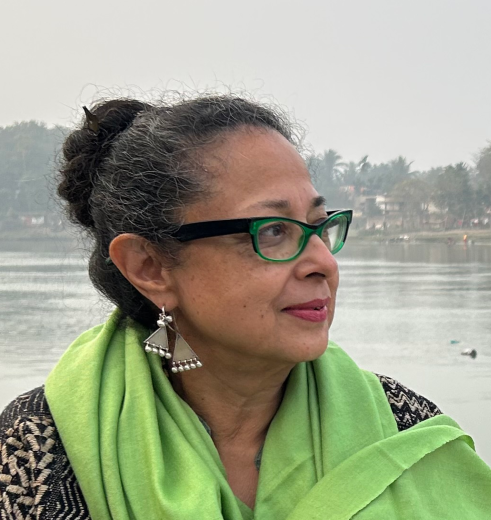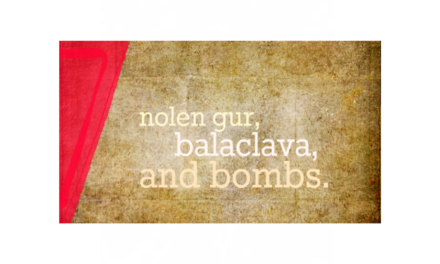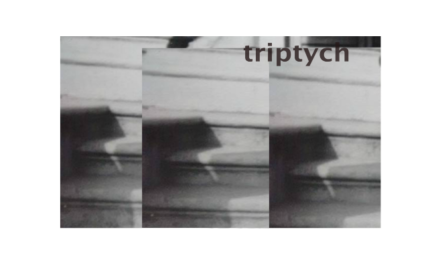“What’s that smell?” Ena said with a grimace and looked around.
Rosy paused in her tracks and sniffed.
“Where? What smell?” she said, not being able to detect any odour, good or bad.
Ena shook her head, still looking about, her nose wrinkling, then she exclaimed impatiently, “That horrible smell! Don’t tell me you can’t get it… where is it coming from?”
Rosy brought the plate full of pickle up to her nose and sniffed, “Nah, it’s not from here!” she said.
“Of course, it’s not!” Ena snapped.
***
It had started raining really hard all of a sudden, Rosy had pulled Ena away from the edge of the verandah which was already quite wet and slippery.
They’d just walked around the house along the wide verandah that ran all the way in a loop, carrying their plates of aamer morobba, raw mango chutney and kooler achar, plum pickle. Here, at the back where it was peaceful and usually no one came in the afternoons, they planned to sit and chat and slowly devour the post lunch treat. It had been years since they’d done that.
Ena and Rosy’s fathers were first cousins, but the two girls were closer than sisters really, as they’d grown up together in this house where their family had lived for five generations. The house was a large, noisy, not too neat and orderly place with many rooms, both big and small, and one cavernous hall. The verandah with shiny grey mosaic floor stretched all around. Baranda, that’s what everyone called it, but it was more like a gallery or a colonnade even, with tall, grand pillars that supported the roof at equal intervals, in all there were twelve of them. Grandparents, great aunts and great uncles, aunts, uncles, parents, cousins, siblings, everyone lived in the same home and managed to be quite happy, despite their differences.
Ena and Rosy were eight cousins and siblings in all, five girls and three boys, they were the younger girls. Didi, Bordi, and Mejdi were already in their early teens when the two of them were born just a year apart. In time, all eight of them had left home, going where their work or spouse took them. Their youngest uncle, who had been transferred to Bangalore about ten years ago, had decided he’d settle down there, not return to Calcutta.
Much had changed at the house, of course.
And yet, some things had stayed exactly the same.
Dida, Ena’s paternal grandmother, and Rosy’s great aunt, still made her winter and summer pickles and chutneys, even though she was nearly eighty. Sour plum and tamarind got washed, dried, and cooked to wondrous pickle in late December or January. And as the temperature soared, it was time to elicit and preserve all the flavours of mango. Sweet chutney, hot chutney, the sour and spicy aam tel… mango in mustard oil with chickpeas and paanch phoran, five spice… Dida explored all avenues of keeping the king of fruits locked up in jars way past its season.
Getting good help had become progressively harder, but no matter what the servants’ “situation” was, Dida made sure this tradition was maintained. Her dexterity with intricate delicacies was well known. From sweets to savouries to favourites like bodi and shabur papod, to pickles, of course. The joke in the family went, it was only to taste her aamer morobba, the sweet mango chutney with large chunks of raw mango coated with thick, plush, gleaming syrup, that everyone came to Calcutta at least once a year, no matter which part of the world they were now living in.
Ena and Rosy were meeting after a long time though. Rosy married soon after graduating from college and moved to Seattle with her husband. He was a professor of mathematics there. Her annual trips to India started a few years later, once he got tenure and she landed a well paid job after getting a degree in law.
As for Ena, well she was considered to be a little “slow” in most things. Her mother always said that was not the case and it was unjust discrimination, that’s all, because Ena had turned out to be a little darker than the other girls. Actually Ena, according to her mother, was the smartest of the lot. Whatever the truth may have been, Ena changed considerably as she grew up, becoming quieter, subdued. Rosy was the only one she really spoke to or shared anything with. A couple of aunts said, it happened around the time she was nine; others disagreed and said, it happened gradually, you couldn’t really say exactly when. Fact remained, she hardly had any friends other than Rosy, and her academic results went steadily down. When she was twenty and had not yet managed to pass out of school, Bor Jetha, her eldest uncle, suggested it might be a better idea to find a decent, even if not wealthy and highly educated, young man and get Ena married, instead of pushing the poor girl like this and making her sit for exams every year.
Though you might not think so, but Bor Jetha was actually very fond of Ena and had her well being at heart. She’d been an endearing child, who had many things to say about everything. He used to look forward to her prattle when he got back from work. Once when his wife had said to him, it was such a pity Ena was dark even though she was a sweet child, he’d snapped, “Stop talking nonsense! Why do you women go on and on about colour? Are we europeans!”
To Bor Jetha, Ena was the daughter he’d never had. He loved his two sons, both extraordinarily bright academically and talented at playing cricket, even football. He’d have loved them even if they weren’t. Just as he doted on Ena.
It took another three years to find a match for Ena. Jayesh was in the railway service, a station master at that time, based in Jhajha. He was short and slight of built, and had never lived in Calcutta. His family belonged to Jabbalpur in Madhya Pradesh and he spoke Bengali with a sight touch of the Hindi spoken in his part of the world.
This not quite perfect accent had the aunts smiling surreptitiously and exchanging glances. Clearly, Jayesh was not from an illustrious family and he was only a graduate, that too from some unknown college; also, he was not exactly Kartik thakur in terms of his looks. Ena’s mother was heartbroken but the consensus was, Ena was lucky that anyone was willing to marry her now that she was nearly twenty three and had never finished school. He seems like a nice enough fellow, thought Bor Jetha with a sadness in him, and Ena was married off to the young man.
That was almost fifteen years ago. Rosy had come down for her cousin’s wedding and it had been the last time they’d met.
Somehow their visits to Calcutta had never coincided. This time too, they hadn’t planned to be here together, but it had worked out that way. When they saw each other, Ena had looked at Rosy’s jeans, short hair, and tee shirt and said with an arch little smile, “What, you borrowed your son’s clothes and hair cut?”
Rosy had giggled, and tried not to let Ena’s clothes or look bother her. Her cousin’s saree was old and fading, and yet the virulent red of the print seemed to scream at you. Her hair was parted in the middle, shiny with oil, and tied back in a tight plain bun. Carelessly applied red vermilion streaked the parting in her hair, she wore a dull gold chain around her neck, two gold bangles on each arm and small studs on her ears. She reminded Rosy of the irritating aunts from Shantipur, a small town a few hours away from Calcutta, who used to visit every year during Janmashtami, when the family celebrated Krishna’s birth with elaborate prayers and feasts. Rosy noticed Ena’s skin was sallow and flat, her eyes were dull. It felt to Rosy as if her cousin really didn’t care.
But Ena was happy to see Rosy, and the two of them spent as much time as they could with each other.
This afternoon, Rosy had suddenly said as they ate lunch, “Ei chol, let’s go to that back verandah and lie in the sun and chat, ok? Remember, we used to play thief and police there?”
(Hey, let’s go…)
Ena had laughed, “You always got caught! Okay, Dida, can we take some pickle along with us?”
Dida had beamed and rocked back and forth as she said in a frail voice, “What? You are asking me? I thought you always stole it…”
***
“What smell, Ena? What are you saying?” rosy asked again, her voice suddenly rising as she saw Ena begin to run toward the end of the verandah, where a door led to the store room.
Ena reached the tall door with shutters and peeling green paint and pushed it hard. It didn’t open, but she had already turned away and was looking around, her head moving jerkily, a wildness coming into her eyes.
Rosy went across to her quickly and laid a hand on her arm.
“Ei! Ena! Ki re? What’s the matter?!!” she asked, giving Ena’s arm a shake.
(Hey, Ena! What’s up?)
“Na! Na! Na!” Ena was breathing fast, her voice a mere whisper, she didn’t look at Rosy at all…
(No! No! No!)
She could smell it… that smell… her brow furrowed, she began to whimper… a warm wet sensation was creeping up her ears, her throat was tight, her breath felt heavy, intrusive… where… where where was that smell…?
“Ena! Talk to me, tell me!” Rosy shouted trying to get through to her.
Ena stared at her for a moment and then she began to run.
***
“One two three four…” Buro was counting. He was the den, they were playing hide and seek.
It was Janmashtami and the entire extended family was down. there was constant bustle in the house, so much had to be organised. The aunts and grandmothers and mothers were busy with the prayer arrangements and cooking. Nearly a thousand people were expected for the main celebrations. Then there were breakfast, lunch, tea, and dinner for thirty three guests and the family, across the week. All routines had gone haywire and the men of the house were trying to get by without many of the usual comforts, after all, this happened only once a year. Ever since their great grandfather’s time they’d had the Janmashtami puja.
The children were delighted by the absence of norm. no one to breathe down their neck, make sure they ate on time, sat for their studies, went to school. They played through the day. Inside the house, outside near the pond, or behind the Shiva temple, or a little further away where there were tin roof garages for the cars in the neighbourhood.
Rosy and Ena pelted toward the back of the house to hide.
“Ufff!” Rosy exclaimed all of a sudden.
“What!” Ena whispered urgently, they had very little time. Buro had almost reached thirty, the cut off number. He would start looking for them soon. And she was not willing to lose to that horrible boy who gloated about everything and carried tales.
“Let’s go!” Ena tugged Rosy’s hand.
“You go, I’ll just come!” Rosy said as she turned and rushed off.
There was no time to lose, Ena raced up the steps to the verandah and went straight to the back. She knew no one would think of going there, certainly not Buro. He was scared of ghosts and Bor Jetha had told them stories of the ghost who was once seen behind the store room. As she hid by the door, it started raining.
Ena smiled, that was sure to keep Buro away. She closed her eyes and sat down leaning against the door.
The noise was barely audible but she heard it.
“Rosy, tui naki?” Ena whispered so as not to give herself away, just in case it was that pest Buro.
(Rosy, is that you?)
The smell came swiftly. It reached her even before she felt something big and heavy clamping over her mouth and nose, choking her. She tried to scream, but the smell pounded in, blocking her voice, filling her mouth, her throat, her nose, every space it could find. She could taste it on her tongue. A pungent, thick, raw smell, something acrid in it, rotting.
Ena struck wildly with her arms, but she couldn’t move, a heavy arm grasped her tiny body. The unrelenting flesh on her mouth and nose now covered her eyes too. There was darkness everywhere, outside and in… and that stench.
It began growing bigger and more dense, it was taking shape.
For a moment, Ena thought it’s the ghost. Bor Jetha, Bor Jetha, Bor Jetha… where are you?
Then she was being dragged and the smell wrapped all around her. What was falling on her? Ena struggled… there were hands moving all over her. Rough, hefty, angry. She tried to stop the hands, she tried to shout, she tried to bite the hand over her mouth.
There was a bolt of lightning somewhere. In her head. Did someone slap her? Ena kicked and thrashed about… but she could not stop the smell… it held her down…
She was hurting. Agony. She couldn’t breathe, she would die…
Everything was wet. Her clothes, her-
She could feel… the smell. It was entering her throat, it would enter her heart, her stomach and kill her. It was a killer. Ena had to stop it. She had to stop it. She pushed hard against the weight crushing her. Suddenly she was free. She stood up even though everything hurt and started to run. The smell chased her.
She shut her eyes, flung out her arms and pushed with all her might…
Everything was wet… she pushed harder still, and then she was running.
***
Ena lay on the floor of the room, curled up. The rain… she could feel the rain’s dampness everywhere and the cloying touch of the smell. He had hurt her so much. The kind of hurt she had never known could exist. Ena felt her body remember.
She began to weep.
She had come running to the house and gone to the bathing room. No one had noticed her, everyone had been busy. She had washed and washed and washed and cried with pain. At one point, too tired to even wipe her tears, she had gone to her room and fallen asleep.
Ena sat up and adjusted her saree. she slowly dragged herself to the edge of the bed and put her head down.
After twenty nine years, she remembered everything suddenly. She’d been just about nine at the time.
***
Rosy stood outside the door, Ena had gone in and bolted the latch. She knocked a few times, but there was no answer.
A bad feeling had started to steal over Rosy. What was that smell Ena was talking about? What smell?
She was standing there still with the plate of pickle in her hand when Dida walked up to her.
“What happened?” Dida asked, “Didn’t eat your aamer morobba?…”
Then before Rosy could reply, Dida looked out through the window and exclaimed, “Babbah, look at that rain… such a torrent in august… like Kal Boishakhi… in all these years I remember only once before, it was Janmashtami… Srabon… and we had this terrible rain one day. Whole afternoon, evening, night, till the next afternoon…”
Kal Boishakhi. Thunderstorms and pouring rain that come during, or just before, Boishakh, the first month of the Bengali calendar, extending from mid April to mid May.
Rosy let her great aunt ramble on. She had realised Dida was getting lonely, not too many people left to talk to, her sisters in law had both passed away, and Rosy’s mother and aunts were always busy with some work or the other. And anyway, she was here for just a few days, no harm in listening, besides, she loved Dida.
“Mmmm… mmm…” Dida mumbled, chewing on her paan, “Such bad rains, the wind blasted, everything was wet and slippery… next evening we found Shankar, big strong fellow he was! We found him lying on the ground at the back near the store room. Dead.”
Rosy looked up, shocked.
“Yes,” said Dida, “He had slipped from the verandah and fallen down, hit his head on the ground, and died! Who would have thought… no one knew, it had been raining. Shankar… he was very strong, you know. always helped me with the pickles. he could carry and fetch those heavy boyems and bags of mangoes, sour plum so easily… these days, the servants…”
(jars)
Rosy stared at dida.
She had left Ena that day because she had suddenly remembered she had to give Bordi a book. She didn’t want to be scolded by her elder cousin.
Rosy took a deep breath. Then she started banging loudly on the door.
What had happened to Ena after she’d gone away?
Rosy began to cry.
………………………………………………………………………………………..
Have you ever been assaulted by a smell? Once, on a flight, I sat next to a passenger who was, to put it politely, highly odorous. The smell wiped out my defences and had me trapped, barely breathing, for nearly three and a half hours. It stayed in my head for hours afterward. This story is definitely an outcome of that. A rambling house that has always been part of my life, and one I never quite made peace with, now shows me stories lying around in its corners and back rooms and other places. My grandmother made the most delicious mango morobba or murabba, I miss it. I have used several Bengali words, hope that didn’t cut into the flow. “Kartik Thakur” is the god of love and considered an epitome of good looks. “Bodi” ( the “di” pronounced with the rolling d sound which doesn’t exist in English) is made with soaked and ground lentil that’s spiced and dried in little bite size bits, and used in certain dishes.”Shabur papod” is poppadum made with sago. “Janmashtami” is the celebration of Lord Krishna’s birth anniversary and usually falls in August, during the Bengali month of “Srabon”. “Didi” is elder sister or those who are like an elder sister to you. “Bordi” usually is the eldest among sisters, “Mejdi” straight after that. “Bor Jetha”… Jetha refers to a paternal uncle who is older than your father. “Bor/Boro” means big/eldest, the one after that is “mejo” then “shejo”, “naw”, “chhoto”. Sometimes a “ranga” comes in before that. Yeah, it’s complicated. This is not a light story, thank you for reading.





